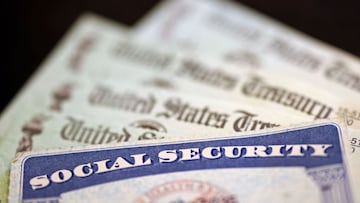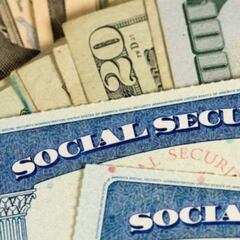Can you change your Social Security number for any reason?
The Social Security Administration allows people to change their Social Security number but only in very limited situations and you’ll need document why.

Social Security numbers are an omnipresent part of life and meant to be unique to each holder and be kept for life. There are times though that a person may want to change the number assigned to them by the Social Security Administration (SSA).
The process is not easy and will require that an individual provide proof that the change is necessary due to the problems their original number is causing them or the harm that may come to them if a change isn’t made.
Also see:
- Social Security local offices remain closed
- Is Social Security protected from a government shutdown?
- Will Social Security beneficiaries get a fourth stimulus check?
- US stimulus checks: live updates
Reasons accepted for requesting a new Social Security number
The SSA, although it is discouraged, does allow for people to change their Social Security number but the list of reasons is limited and requires the individual to extensively prove that the request is valid and necessary. Reasons can include financial harm caused by identity theft or one’s life is in danger due to domestic violence, among others.
To get a Social Security number changed, the person requesting it must do so in person at one of the Social Security offices, making an appointment ahead of time.
In the event the SSA agrees that a person is eligible to have their number changed, they will still retain their old number for the agency’s record keeping. This ensures that all contributions, both on the original number and the new number are tallied to the same person. Likewise, the original number may still be used by financial institutions or state agencies in addition to the new number.
Protect what’s important to you, and don’t carry your #SocialSecurity card with you every day. In most cases, knowing the number is enough. Learn more tips on how to #GuardYourCard: https://t.co/dHaGMOWZaf pic.twitter.com/AWbP0vdDib
— Social Security (@SocialSecurity) November 24, 2021
Personal safety is at risk
When “there is a situation of harassment, abuse or life endangerment,” the SSA will issue a new Social Security number to help ensure the safety of the person in question. Documentation will be required such as, police reports and/or restraining orders or medical records of injuries. Also, you will need to provide letters from people with direct knowledge of the abuse, domestic violence and/or harassment like counselors, friends or family members.
If a name change needs to be made as well, it is recommended that this be done first. The agency provides specific information for those who are experiencing domestic violence and in need of a new Social Security number.
Religious or cultural objections to certain numbers or digits
Although the SSA expanded the numbers available to be used when the agency randomized the numbering system in 2011, there are still certain numbers that are not issued. When someone is assigned a Social Security number that number may be objectionable to that person based on their culture or religion. The agency makes an exception for these people to have their number changed. But the SSA requires “written documentation in support of the objection from a religious group with which the number holder has an established relationship.”
On the go? See what you can do online with #SocialSecurity here: https://t.co/7iVYrDKSAk pic.twitter.com/nvZczQ9ac1
— Social Security (@SocialSecurity) November 26, 2021
Numbers belonging to or used by more than one person
Although the SSA has a system set up to randomly assign unique numbers to each US citizen, one of the exceptions allowed is in the case that two people have or are using the same Social Security number. The latter is all too common according to a 2010 ID Analytics study. At that time some 40 million people, or one in seven of the numbers issued at the time, were used by more than one person.
Some could be due to clerical errors by companies or employees when filling out forms. However, it could be down to someone fraudulently using another person’s Social Security number to commit fraud or illegally live and work in the US. To prevent identity theft the SSA recommends that you keep your Social Security Card in a safe and secure place.
Identity theft that is continuing to cause hardship
By itself, identity theft is not a singular reason that the SSA will issue a new number. Continued hardship by using the original Social Security number must be proven. Also a person must demonstrate that they have exhausted all possible means to solve the problem.
A victim of identity theft has to show with documents from third parties that their number is being used for fraudulent transactions. As well that that use is causing ongoing harm such as loans being denied or their credit rating is being adversely affected. The SSA provides a guide for victims of identity theft.
One number is issued to two different people
You may be wondering, if Social Security numbers are unique to each person, how could two people have the same number assigned to them?
There are the exceptional times when the SSA issues the same number to two people as happened to two women in Florida. Both women were born on the same day and given nearly identical names. Add to the confusion two hospitals created the same birth record resulting in 25 years of tribulations for the two.
Can you recognize #SocialSecurity phone scams? Arm yourself against scammer tactics like this. Watch this important message from us to learn more. https://t.co/6KTqLpI1ot pic.twitter.com/IukyP5xQmr
— Social Security (@SocialSecurity) November 22, 2021
Family members have sequential numbers
Like with the case of the two women in Florida, family members often share similar names and if members of the same family also have similar Social Security numbers further confusion can ensue. As with any of the cases where the SSA will consider changing the original number assigned to an individual, documentation will need to be provided to prove that the situation is causing hardship and is necessary.
How to change your Social Security number
Related stories
You must make an appointment with a Social Security office to request a new Social Security number and bring along all necessary paperwork required.
Along with the necessary documents to prove why you are requesting a change of number, you will need to fill out an application for a new card and provide a written statement for why you require a new Social Security number. You will also need to provide original documents of identity, and if needed, evidence of legal name change, as well as proof of age and US citizenship or work-authorized immigration status.


